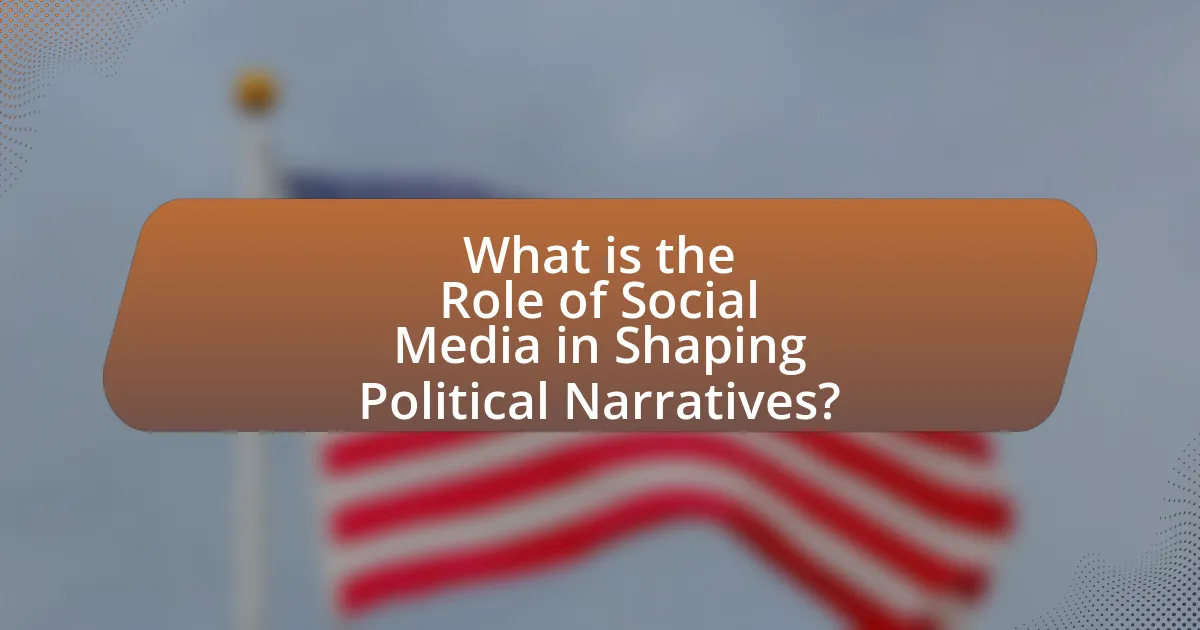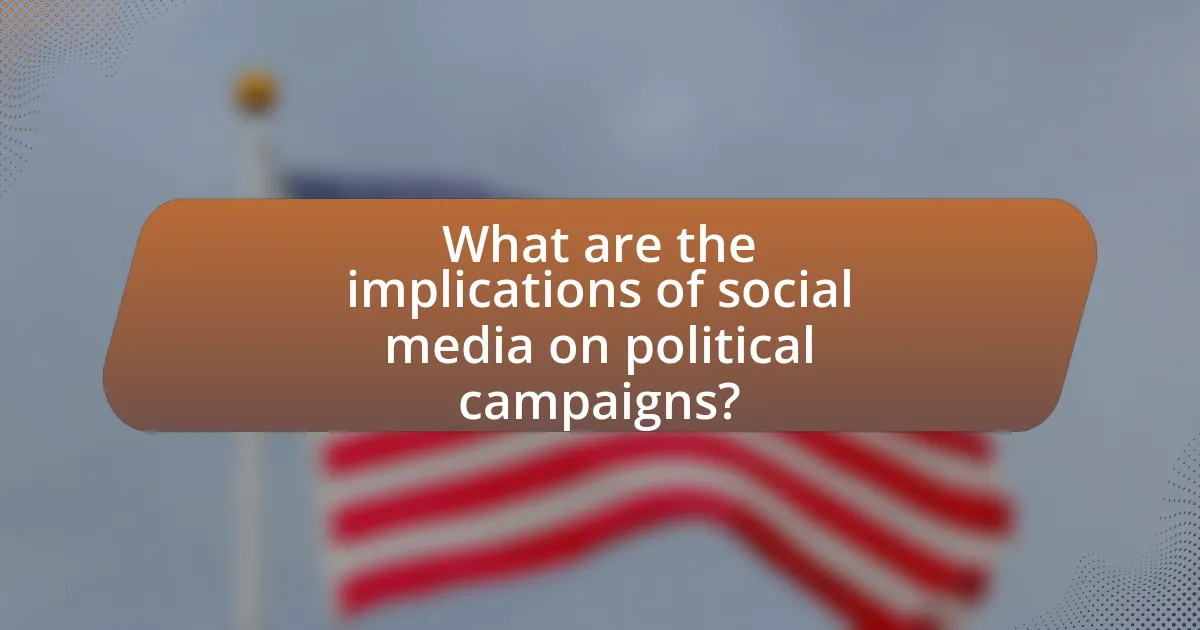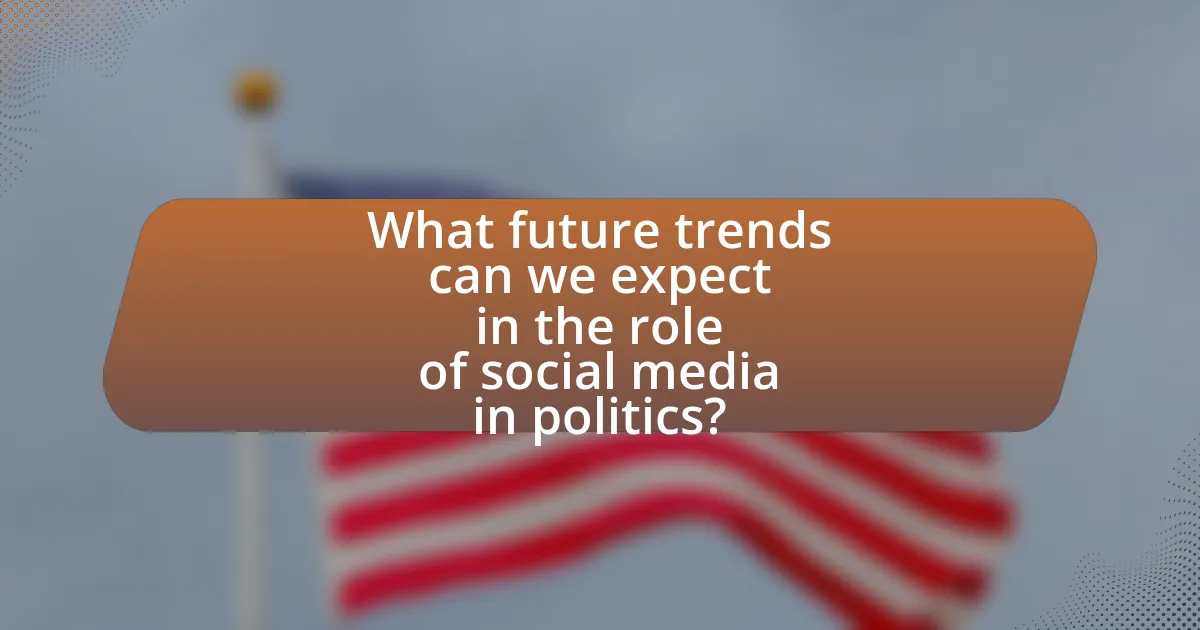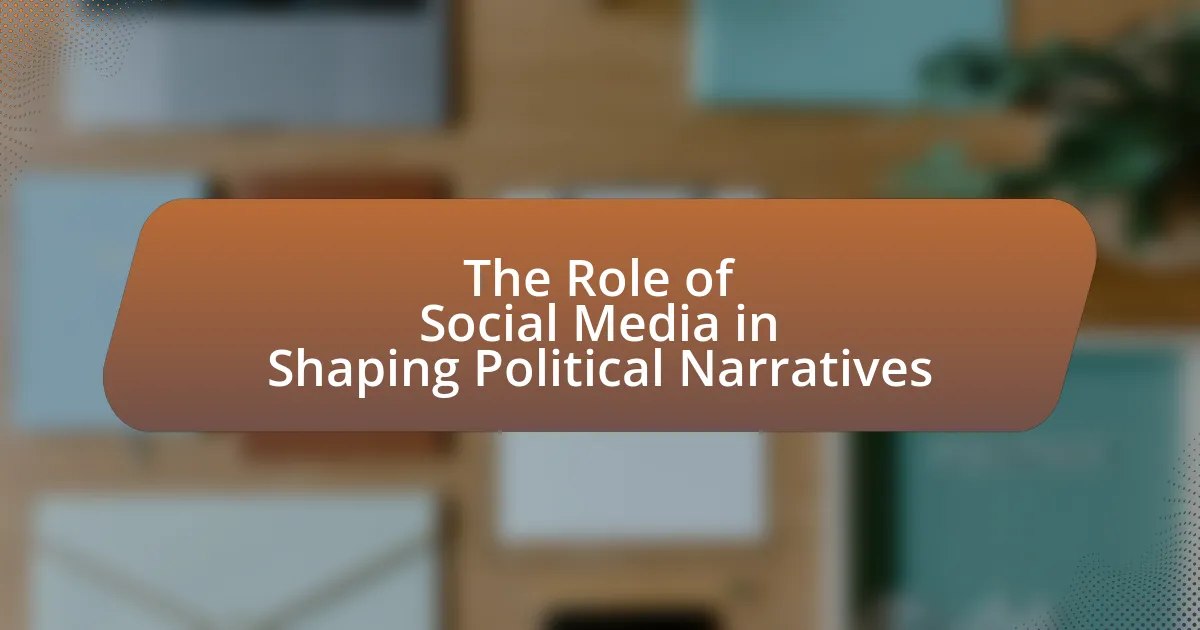The article examines the significant role of social media in shaping political narratives, highlighting its capacity for rapid information dissemination and direct engagement between politicians and the public. It discusses how social media influences political discourse through mechanisms such as algorithm-driven content curation, user-generated content, and the creation of echo chambers, which can polarize opinions. The article also addresses the impact of social media on voter mobilization, the challenges posed by misinformation, and the ethical considerations surrounding political advertising. Additionally, it explores demographic engagement patterns and future trends in social media’s influence on politics, emphasizing the need for transparency and effective strategies to combat misinformation.

What is the Role of Social Media in Shaping Political Narratives?
Social media plays a crucial role in shaping political narratives by providing platforms for the rapid dissemination of information and facilitating direct engagement between politicians and the public. This immediacy allows political messages to reach a wide audience quickly, influencing public perception and opinion. For instance, during the 2016 U.S. presidential election, social media platforms like Twitter and Facebook were instrumental in spreading campaign messages and mobilizing voters, with studies indicating that 62% of Americans received news from social media. Furthermore, social media enables the amplification of specific narratives through algorithms that prioritize engaging content, often leading to echo chambers where users are exposed primarily to viewpoints that reinforce their existing beliefs. This phenomenon can significantly impact political discourse and voter behavior, as evidenced by research from the Pew Research Center, which found that 64% of Americans believe social media has a mostly negative effect on the way things are going in the country today.
How does social media influence political discourse?
Social media significantly influences political discourse by providing a platform for rapid information dissemination and public engagement. This immediacy allows political messages to reach a wide audience quickly, shaping public opinion and mobilizing support or opposition. For instance, during the 2016 U.S. presidential election, platforms like Twitter and Facebook were used extensively for campaign messaging, resulting in a substantial impact on voter perceptions and behaviors. Research by the Pew Research Center indicates that 62% of Americans get news from social media, highlighting its role in shaping political narratives and discussions.
What are the mechanisms through which social media shapes political narratives?
Social media shapes political narratives through mechanisms such as algorithm-driven content curation, user-generated content, and echo chambers. Algorithm-driven content curation prioritizes posts based on user engagement, which can amplify certain political messages while suppressing others, influencing public perception. User-generated content allows individuals to share their views, creating a diverse array of narratives that can challenge traditional media. Echo chambers occur when users interact primarily with like-minded individuals, reinforcing existing beliefs and polarizing political discourse. Research indicates that these mechanisms significantly impact voter behavior and public opinion, as seen in studies like “The Role of Social Media in Political Mobilization” by Boulianne (2015), which highlights the correlation between social media engagement and political participation.
How do algorithms affect the visibility of political content?
Algorithms significantly influence the visibility of political content by determining which posts are prioritized in users’ feeds based on engagement metrics. These algorithms analyze user behavior, such as likes, shares, and comments, to promote content that is likely to generate further interaction. For instance, a study by the Pew Research Center found that 64% of Americans believe social media platforms have a significant impact on the political landscape, highlighting the role of algorithms in shaping public discourse. Consequently, content that aligns with users’ preferences or triggers emotional responses is more likely to be seen, while opposing viewpoints may be suppressed, leading to echo chambers and polarized political narratives.
Why is social media a powerful tool for political communication?
Social media is a powerful tool for political communication because it enables direct engagement between politicians and the public, facilitating real-time dialogue and feedback. This immediacy allows political messages to spread rapidly, reaching a wide audience without the traditional gatekeeping of mainstream media. For instance, during the 2016 U.S. presidential election, candidates like Donald Trump utilized Twitter to communicate directly with voters, resulting in over 10 million followers and significant influence over public discourse. Additionally, social media platforms provide analytics that help political campaigns tailor their messages to specific demographics, enhancing the effectiveness of their communication strategies.
What unique features of social media enhance political engagement?
Social media enhances political engagement through its unique features such as real-time communication, broad reach, and interactive platforms. Real-time communication allows users to receive and share information instantly, facilitating immediate discussions around political events. The broad reach of social media enables messages to spread quickly across diverse demographics, increasing awareness and participation in political discourse. Interactive platforms encourage user engagement through comments, shares, and likes, fostering a sense of community and collective action. According to a Pew Research Center study, 69% of adults in the U.S. use social media, highlighting its significant role in shaping political narratives and mobilizing voters.
How does social media facilitate grassroots movements?
Social media facilitates grassroots movements by providing a platform for rapid communication and mobilization among individuals with shared interests. This immediacy allows activists to organize events, share information, and rally support quickly, often leading to significant participation in protests or campaigns. For instance, the Arab Spring in 2011 showcased how platforms like Twitter and Facebook enabled citizens to coordinate demonstrations and disseminate information about government actions, resulting in widespread political change across multiple countries. Additionally, studies indicate that social media can amplify voices that are often marginalized, allowing for diverse perspectives to gain visibility and support, thus enhancing the overall impact of grassroots initiatives.
What challenges does social media present to political narratives?
Social media presents significant challenges to political narratives by enabling the rapid spread of misinformation and creating echo chambers. Misinformation can distort public perception and undermine trust in legitimate sources, as evidenced by the 2016 U.S. presidential election, where false news stories were shared widely, influencing voter opinions. Additionally, echo chambers reinforce existing beliefs, limiting exposure to diverse viewpoints and polarizing political discourse, which research from the Pew Research Center indicates has increased political polarization among users. These factors complicate the ability of political narratives to engage a broad audience and foster informed debate.
How does misinformation spread on social media platforms?
Misinformation spreads on social media platforms primarily through user engagement, including likes, shares, and comments, which amplify false narratives. Research indicates that misinformation is 70% more likely to be retweeted than accurate information, as shown in a study by Vosoughi, Roy, and Aral published in Science in 2018. This rapid dissemination occurs due to algorithms prioritizing engaging content, regardless of its truthfulness, leading to a viral effect that can distort public perception and influence political narratives.
What impact does echo chamber effect have on political beliefs?
The echo chamber effect significantly polarizes political beliefs by reinforcing existing views and limiting exposure to diverse perspectives. This phenomenon occurs when individuals engage primarily with like-minded groups, leading to a confirmation bias that strengthens their pre-existing opinions. Research indicates that social media platforms facilitate this effect by algorithmically curating content that aligns with users’ interests, thereby isolating them from opposing viewpoints. A study by the Pew Research Center found that 62% of social media users encounter information that reinforces their beliefs, which contributes to increased political polarization and a diminished capacity for constructive dialogue across differing political ideologies.
How do different demographics engage with political content on social media?
Different demographics engage with political content on social media in varied ways, influenced by factors such as age, education, and political affiliation. For instance, younger users, particularly those aged 18-29, are more likely to share political content and engage in discussions on platforms like Twitter and Instagram, with 50% of this age group reporting that they have shared political content online, according to the Pew Research Center. In contrast, older demographics, such as those aged 65 and above, tend to consume political content more passively, often favoring Facebook for news consumption, where 61% of older adults report getting news from the platform. Additionally, individuals with higher education levels are more likely to engage critically with political content, participating in discussions and sharing articles, while those with lower education levels may rely on simpler, more sensational content. These engagement patterns highlight the significant role that demographic factors play in shaping how political narratives are consumed and disseminated on social media.
What trends can be observed in social media usage among various age groups?
Social media usage trends vary significantly among different age groups. Younger users, particularly those aged 18-29, predominantly favor platforms like Instagram and TikTok, which emphasize visual content and short-form videos, with 71% of this demographic actively using Instagram as of 2021. In contrast, users aged 30-49 show a preference for Facebook and Twitter, with 78% of individuals in this age range utilizing Facebook for news and social interaction. Older adults, particularly those aged 50 and above, increasingly adopt Facebook, with 46% of this group reporting daily usage, reflecting a growing trend towards social media engagement among seniors. These patterns indicate that younger generations gravitate towards dynamic, visually-driven platforms, while older users tend to favor established networks that facilitate broader social connections and information sharing.
How do cultural factors influence political engagement on social media?
Cultural factors significantly influence political engagement on social media by shaping users’ values, beliefs, and communication styles. For instance, collectivist cultures often emphasize community and group consensus, leading to higher engagement in political discussions that reflect these values, while individualistic cultures may prioritize personal expression and debate. Research indicates that cultural context affects how political messages are framed and received; for example, a study by the Pew Research Center found that social media users from different cultural backgrounds engage with political content in ways that reflect their societal norms and expectations. This cultural lens can determine the types of political content that resonate, the platforms used for engagement, and the overall level of participation in political discourse online.

What are the implications of social media on political campaigns?
Social media significantly influences political campaigns by enabling direct communication between candidates and voters, enhancing engagement and outreach. This platform allows for real-time interaction, where candidates can respond to public sentiment and adjust their messaging accordingly. For instance, during the 2016 U.S. presidential election, Donald Trump’s use of Twitter allowed him to bypass traditional media filters, directly addressing millions of followers and shaping public discourse. Additionally, social media facilitates targeted advertising, where campaigns can analyze user data to tailor messages to specific demographics, increasing the effectiveness of their outreach. According to a study by the Pew Research Center, 69% of adults in the U.S. use social media, highlighting its critical role in shaping political opinions and mobilizing voters.
How do political candidates utilize social media for campaigning?
Political candidates utilize social media for campaigning by engaging directly with voters, disseminating information, and shaping public perception. They create targeted advertisements and content that resonate with specific demographics, leveraging platforms like Facebook, Twitter, and Instagram to reach a broader audience. For instance, during the 2020 U.S. presidential election, candidates spent over $1 billion on social media ads, highlighting its significance in modern campaigning. Additionally, social media allows candidates to respond quickly to current events and controversies, enabling them to control their narrative and mobilize supporters effectively.
What strategies are most effective for engaging voters on social media?
Effective strategies for engaging voters on social media include targeted advertising, interactive content, and community building. Targeted advertising allows campaigns to reach specific demographics, increasing the likelihood of engagement; for instance, Facebook’s ad platform enables precise targeting based on user data. Interactive content, such as polls and quizzes, fosters participation and encourages sharing, which can amplify reach. Community building through consistent communication and responding to voter inquiries creates a sense of belonging and loyalty among supporters. Research by the Pew Research Center indicates that 69% of adults in the U.S. use social media, highlighting its potential as a powerful tool for political engagement.
How do social media platforms shape campaign messaging?
Social media platforms shape campaign messaging by enabling targeted communication and real-time engagement with voters. These platforms allow campaigns to analyze user data, tailoring messages to specific demographics, interests, and behaviors, which increases the relevance and impact of the messaging. For instance, a study by the Pew Research Center found that 69% of adults in the U.S. use social media, making it a crucial channel for reaching a broad audience. Additionally, social media facilitates immediate feedback and interaction, allowing campaigns to adjust their messaging strategies based on public response and trending topics. This dynamic environment fosters a more agile approach to communication, enhancing the effectiveness of campaign messaging.
What role does social media play in voter mobilization?
Social media plays a crucial role in voter mobilization by facilitating communication, engagement, and information dissemination among potential voters. Platforms like Facebook, Twitter, and Instagram enable political campaigns to reach a broad audience quickly, allowing for targeted messaging that resonates with specific demographics. For instance, a study by the Pew Research Center found that 69% of adults in the U.S. use social media, making it an effective tool for campaigns to encourage voter participation and inform users about voting procedures. Additionally, social media fosters community building and peer influence, as users often share content related to political events, thereby motivating their networks to engage in the electoral process.
How effective are social media campaigns in increasing voter turnout?
Social media campaigns are highly effective in increasing voter turnout, with studies indicating that they can boost participation rates by up to 10%. Research conducted by the Pew Research Center shows that social media platforms significantly influence political engagement, particularly among younger demographics. For instance, a study published in the journal “Political Communication” found that targeted social media ads and engagement strategies led to a measurable increase in voter registration and turnout during the 2018 midterm elections. This demonstrates that social media serves as a powerful tool for mobilizing voters and enhancing democratic participation.
What tools do campaigns use to track engagement and influence?
Campaigns use analytics tools such as Google Analytics, social media insights (like Facebook Insights and Twitter Analytics), and specialized platforms like Hootsuite and Sprout Social to track engagement and influence. These tools provide metrics on user interactions, reach, and demographics, allowing campaigns to assess the effectiveness of their messaging and strategies. For instance, Facebook Insights reports on post engagement rates and audience demographics, enabling campaigns to tailor their content effectively.
What are the ethical considerations surrounding social media in politics?
The ethical considerations surrounding social media in politics include misinformation, privacy violations, and the manipulation of public opinion. Misinformation can spread rapidly on social media platforms, leading to distorted perceptions of political issues and candidates, as evidenced by the proliferation of false narratives during elections, such as the 2016 U.S. presidential election where false information significantly influenced voter behavior. Privacy violations occur when personal data is harvested without consent, raising concerns about surveillance and data security, highlighted by incidents like the Cambridge Analytica scandal, where data from millions of Facebook users was exploited for political advertising. Additionally, the manipulation of public opinion through targeted advertising and algorithmic bias can create echo chambers, limiting exposure to diverse viewpoints and undermining democratic discourse. These ethical issues necessitate ongoing scrutiny and regulation to ensure accountability and transparency in the political use of social media.
How do privacy concerns affect political engagement on social media?
Privacy concerns significantly reduce political engagement on social media by creating apprehension among users about sharing personal opinions and participating in discussions. Research indicates that individuals who fear their data may be misused or exposed are less likely to engage in political discourse online. For instance, a study by the Pew Research Center found that 64% of Americans have experienced a major data breach, leading to increased caution in sharing political views. This hesitance can stifle open dialogue and limit the diversity of perspectives in political conversations, ultimately affecting the overall political landscape on social media platforms.
What regulations exist to govern political advertising on social media?
Regulations governing political advertising on social media include the Federal Election Commission (FEC) rules in the United States, which require disclosure of the source of funding for political ads and prohibit foreign entities from participating in political advertising. Additionally, platforms like Facebook and Twitter have implemented their own policies, such as transparency tools that allow users to see the funding sources and targeting criteria for political ads. These regulations aim to ensure accountability and transparency in political messaging, particularly in light of concerns about misinformation and foreign interference in elections.

What future trends can we expect in the role of social media in politics?
Future trends in the role of social media in politics include increased polarization, the rise of misinformation, and enhanced engagement through interactive platforms. Research indicates that social media algorithms often prioritize sensational content, which can exacerbate political divisions, as seen in the 2016 U.S. presidential election where targeted ads and misinformation campaigns significantly influenced voter perceptions. Additionally, the use of live streaming and real-time interaction is expected to grow, allowing politicians to engage directly with constituents, as evidenced by the popularity of platforms like Twitter and Instagram for political discourse. These trends suggest that social media will continue to be a powerful tool in shaping political narratives and influencing public opinion.
How might emerging technologies impact political narratives on social media?
Emerging technologies significantly impact political narratives on social media by enabling the rapid dissemination of information and facilitating targeted messaging. For instance, algorithms used by platforms like Facebook and Twitter can amplify specific political content based on user engagement, leading to echo chambers where users are primarily exposed to viewpoints that reinforce their existing beliefs. Additionally, advancements in artificial intelligence allow for the creation of deepfakes and misinformation, which can distort political realities and manipulate public perception. Research from the Pew Research Center indicates that 64% of Americans believe fabricated news stories cause confusion about the basic facts of current events, highlighting the profound effect of these technologies on political discourse.
What role will artificial intelligence play in shaping political content?
Artificial intelligence will significantly influence the shaping of political content by automating content creation, personalizing political messaging, and analyzing voter sentiment. AI algorithms can generate tailored political advertisements and social media posts that resonate with specific demographics, enhancing engagement and effectiveness. For instance, a study by the Pew Research Center found that 64% of Americans believe social media has a major impact on political opinions, highlighting the importance of AI in optimizing content for these platforms. Additionally, AI tools can analyze vast amounts of data from social media interactions to gauge public sentiment, allowing political campaigns to adjust their strategies in real-time based on voter reactions. This capability underscores AI’s role in not only shaping but also responding to the evolving political landscape.
How could changes in social media policies affect political discourse?
Changes in social media policies can significantly alter political discourse by influencing the flow of information and the types of content that are promoted or suppressed. For instance, stricter content moderation policies may reduce the spread of misinformation, leading to more informed public discussions, while overly restrictive policies could stifle legitimate political expression and dissent. Research from the Pew Research Center indicates that 64% of Americans believe social media has a mostly negative effect on the way things are going in the country, highlighting the potential for policy changes to either mitigate or exacerbate public concerns about political polarization and misinformation.
What best practices should political entities follow when using social media?
Political entities should prioritize transparency, engagement, and authenticity when using social media. Transparency involves openly sharing information about policies and decisions, which builds trust with constituents. Engagement requires actively responding to followers and participating in discussions, fostering a sense of community and connection. Authenticity is crucial; political entities should present genuine messages that reflect their values and beliefs, as studies show that authentic communication enhances credibility and relatability. For instance, a 2020 Pew Research Center study found that 69% of Americans believe social media is an important platform for political engagement, highlighting the need for effective practices in this space.
How can political organizations effectively combat misinformation?
Political organizations can effectively combat misinformation by implementing fact-checking initiatives and promoting media literacy among their constituents. Fact-checking initiatives involve verifying claims made in political discourse and disseminating accurate information through various channels, including social media platforms. For instance, organizations like PolitiFact and FactCheck.org have demonstrated success in debunking false claims, thereby enhancing public trust in verified information. Additionally, promoting media literacy equips individuals with the skills to critically evaluate sources and discern credible information from misinformation, as evidenced by studies showing that media literacy programs can significantly reduce susceptibility to false information.
What strategies can enhance authentic engagement with constituents?
To enhance authentic engagement with constituents, utilizing transparent communication strategies is essential. This involves actively sharing information about decision-making processes and encouraging open dialogue through social media platforms. Research indicates that 70% of constituents prefer to engage with representatives who are transparent and responsive, as highlighted in the 2021 Pew Research Center study on civic engagement. Additionally, employing interactive content, such as polls and Q&A sessions, fosters a sense of community and involvement, further strengthening the relationship between constituents and their representatives.
